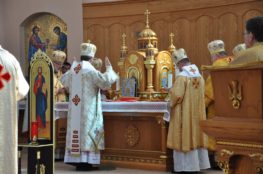By now most Latin Catholics with an interest in liturgical matters know the complaint: The so-called 1962 books (Missale Romanum, Breviarium Romanum, etc.) which are approved for official Church use are inferior to those in use up until around 1954. The litany of changes instituted by Popes Pius XII and John XIII were imprudent, sloppy, and, in the case of Holy Week, revolutionary. However, as I have argued many times before, the average Catholic in the pew would hardly know the difference. The primary difference between a Sunday Tridentine Mass served according to the 1962 Missal and one served according to a 1954 (or earlier) Missal is the absence of commemorations. The third Confiteor was technically eliminated too, though many traditional groups, including the Society of St. Pius X, the Institute of Christ the King, and the Canons Regular of St. John Cantius continue to recite it. A noticeable number of diocesan clergy appear to as well. Where the 1955-62 liturgical changes are most noticeable is in the breviary, though due to the accidents of ecclesiastical history, the Divine Office is almost exclusively confined to the clergy. Public recitation has all but disappeared.
The reason I make mention of this again is not to argue for the superiority of the 1962 books (which I have never done), but to issue a fresh reminder that given the present state of liturgical affairs in the Roman Church, squabbling over minor variances is a waste of resources. (The one exception to this is revised rite of Holy Week, which should be cast into outer darkness.) Some Catholics attached to traditional Western liturgy occasionally point to the Orthodox as paragons of liturgical virtue, even going so far as to promote the myth that the Orthodox never revise or abbreviate their services. Nonsense. In the past century both the Greek and Antiochian Orthodox have adopted a highly truncated form of Matins (Orthros) for parish usage. Numerous Orthodox jurisdictions have also trimmed parts of the Divine Liturgy, including the Litany of the Catechumens and Psalm 33. While none of these changes alters the core structure or integrity of the Divine Liturgy, they are arguably more perceptible than any abbreviations found in the 1962 Missal.
It is also worth keeping in mind that even liturgical maximalists like the Russian Orthodox Church Outside of Russia (ROCOR) regularly exercise liturgical prudence at the parish level. The All-Night Vigil doesn’t actually last into the wee hours. Psalter readings are shortened, hymns are intoned rather than chanted, and some elements are occasionally dropped altogether. Even in ROCOR monastic environs, the Vigil service is likely to last no more than three or four hours (depending on the occasion). It’s hard to imagine a Latin Catholic liturgical purist wailing about missing troparia in the canons of Byzantine Matins with the same hyperbolic indignation he is prone to let loose against a dropped Collect at Mass. The reason is simple. The Byzantine Rite is long, multilayered, and, arguably, overcrowded; the traditional Roman Rite is austere, elegant, and comparatively stripped-down. It is easy to pitch a fit over minor details concerning the latter while blithely ignoring many in the former.
A wise and humble ROCOR priest once said, “Pray as you can, not as you wish you could.” Being the pastor of a modest rural parish, he recognized that the resources available to a cathedral or city church (large choir, multiple clergy, an infantry of altar servers, etc.) weren’t available to him, so he makes do with what he has. In the Roman Church today, many traditional Catholics are fortunate to find any priest who can serve the traditional Latin Mass period. No doubt many would love to have a high Mass every Sunday, but that is usually not possible, at least not at first. Thankfully the situation appears to be changing, particularly in urban areas, but there is still a lot of work to do. As I discussed in an article for The Angelus magazine, “Roman Liturgy in the Light of the East,” there is a lot traditional Latin Catholics can learn from Orthodoxy’s liturgical ethos, but implementing that learning won’t happen overnight.
Similarly, correcting any potential defects in the 1962 books is a long-term project. It needn’t be a divisive issue. As the traditional Roman liturgy continues—God willing—to spread, more priests and laity will begin to see where changes need to be made; what parts of the pre-1962 books should be recovered; and how the Mass might be better served with the full dignity it deserves. This is a process (some might say a struggle) shared by Greek Catholics, too. (For more on that, see my earlier post on Greek Catholic liturgy here.) It is a process that will never be completed, however, if the faithful keep bickering over secondary, nay, tertiary liturgical matters.




October 14, 2015
What is the difference between discussion and squabbling?
Also, for what it’s worth, any number of diocesan celebrations of the E.F. discreetly implement a number of pre-1962isms, and this appears to be a growing phenomenon.
October 14, 2015
Have you never visited the Liturgiae Causa blog? You will see the difference immediately.
And yes, there is a nice organic shift toward pre-1962 elements underway. However, it seems to me that the most important business is to institute a shift toward the traditional Mass in general.
October 15, 2015
Well, sure, but that’s like saying that there are problems with Christianity, and offering the antics of Westboro Baptist Church as evidence. Yes, it’s silly and unedifying to see Mr Sheridan picketing various events with his GOD HATES TRADS sign, but he is a statistical sample size of n=1, and fairly unique in my experience. Virtually everyone else I know who has complaints about the revised 1962 liturgy has made a home for themselves in a parish where the 1962 rites are offered, and they get on with life, devoting a spare hour here or there to writing about the perceived flaws of the various revisions.
October 15, 2015
Well, one could add in here as well those traditionalists who align with groups like the Society of St. Pius V or the various sedevacantist sects. One of their “sticking points” is that the 1962 is quasi-Novus Ordo. Also, I know more than a few people who attend SSPX chapels and diocesan Masses who spend an inordinate amount of time grousing about liturgy. It doesn’t seem very helpful to me.
October 15, 2015
If the liturgical grousers were actually disrupting services at their local EF apostolates, maybe I’d share in your intermittent frustration about critics of the ’62 books. As it is, I tend to read their grousing on Facebook and on their ‘blogs, which seem like fair outlets for grousing. I would add that one of the bloggers I read who is most critical of the ’62 reforms tries to help with liturgical restoration at his EF chapel as he can, and MC’s according to straight ’62 in good faith when he can’t.
October 15, 2015
I will readily admit that I only really know the pre-1962 books, and am quite happy with them; but my main problem with the 1962 books is the Kalendar, which quite honestly seems very strange to say the least (what is Ordinary time and what does that really mean?). But on another note, I have no problems with simplifying some of the rubrics and numbers of commemorations; but the ranking of feasts is difficult to understand (at least for me). The transferal of feasts is an issue too; at least in the old rite, one knew what to do when doubles of the same class fell on the same day or Sunday, now everything is different.
My real problem is the fixation on Latin, why? The rite should be allowed in the vernaculars, the fact that it is not will always limit its appeal and future (and is very telling about the thought processes of those in power). Even before Vatican II, the old Roman rite was celebrated in quite a few languages other than Latin.
October 15, 2015
Ordinary Time arrived in 1970, not 1962. I would add that if a rank novice wanted to learn the ’62 rubrics, including rules for precedence and concurrence, as I once did, there are plenty of readily available resources online and in print; see for instance http://maternalheart.org/library/1962rubrics.pdf. On the other hand, best of luck if you want to learn pre-’55 from scratch!
October 15, 2015
But why change the old Kalendar for one that is truly bizarre in the first place? What is ordinary time, the whole concept of an ecclesiastical Kalendar is the santification of time, what does ordinary sanctify?
October 15, 2015
Oh, and the last time I attended a 1962 celebration, the priest mentioned in that is was a certain Sunday in “Ordinary Time.” So they must be using it; even if it is from 1970.
October 15, 2015
And then there’s this…
October 15, 2015
The Western Rite is great in theory; in execution it is a mess, both in texts it uses and on-the-ground practice. The interpolation of a Byzantine epiclesis into the Roman canon (despite the words of St. Nicholas Cabasilas) makes it sound rather insincere when we claim that the West was just as Orthodox as the East.
October 15, 2015
Well, I agree re: the epiclesis. But in my experience, as a member of an actual AWRV parish using the ancient Roman rite, the execution has actually been quite good.
October 15, 2015
I think that after the forced Byzantinization of all Antiochian western rite parishes in England and the Philippines (which had the largest numbers of people), this can hardly be construed as an alternative to anything.
October 16, 2015
[…] The real issue I read in these various posts is one of rubricism. The articles in question are The Traditional Roman Liturgy Question and Eastern Liturgics and the heads-up I got from a surprising reaction from my old friend in Kent, Fred Phelps… […]